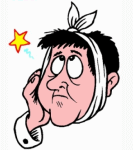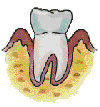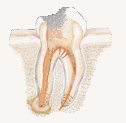
Toothache Symptoms
All toothaches are not the same. Several dental and some non dental health conditions may cause toothache symptoms. The type and characteristics of tooth pain symptoms can help identify the cause of toothache. However, always remember that the only person qualified for examining your symptoms and making a successful diagnosis is your dentist.
Toothache Symptoms - Tooth Pain Symptoms Guide
Although one specific tooth pain symptom may be enough in most cases for your dentist to identify the root cause of your toothache, this is not always that easy.
In some cases of referred tooth pain it may be difficult even for a dentist to find which tooth is the source of the pain and what problem is causing it. It is advised that you do not try to make your own diagnosis, but visit your dentist as soon as possible for a dental examination.
Most toothaches are caused by a dental problem related with your teeth and gums, but other health conditions such as heart problems may also cause toothache symptoms. Misdiagnosing the source of a tooth pain may put your overall health and even your life at risk.
Several dental conditions can also lead to serious and possibly life threatening complications. Underestimating a toothache caused by a tooth infection by believing that it will pass and delaying to visit a dentist may allow the infection to spread. The result will be more pain, loss of tooth and need for more expensive treatments.
The following guide should be used only for informational purposes. If you have a toothache, refer to your dentist for proper examination and diagnosis.
Tooth Pain Symptoms and possible Causes
| Symptoms | Possible causes |
|
|
|
|
|
|
|
|
|
|
|
|
|
|
|
|
|
|
|
|
|
|
|
|
|
|
|
|
|
|
|
|
|
|
|
|
Some symptoms related to a toothache may be common for several dental problems.
Only a dental professional has the knowledge and experience to correctly distinguish the characteristics of a toothache and in combination with the clinical examination can determine the cause of the problem and the proper treatment. What you have to do is to visit your dentist whenever you get a toothache, and not wait to see if it will pass on its own. It will not.
Contact your dentist or an emergency unit immediately if you have a toothache with any of the following symptoms:
- High fever
- Difficulty breathing or swallowing
- Swelling in the neck or throat area
- Pain in the chest or arm

 Dental Insurance
Dental Insurance Sensitive Teeth Pain
Sensitive Teeth Pain Cracked Tooth Pain
Cracked Tooth Pain Tooth Abscess Pain
Tooth Abscess Pain Tooth Extraction Pain
Tooth Extraction Pain Toothache Medicines
Toothache Medicines